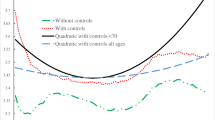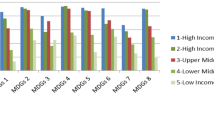Abstract
This paper analyses the effect of income inequality on Europeans’ quality of life, specifically on their overall well-being (happiness, life satisfaction), on their financial quality of life (satisfaction with standard of living, affordability of goods and services, subjective poverty), and on their health (self-rated health, satisfaction with health). The simple bivariate correlations of inequality with overall well-being, financial quality of life, and health are negative. But this is misleading because of the confounding effect of a key omitted variable, national economic development (GDP per capita): Unequal societies are on average much poorer (r = 0.46) and so disadvantaged because of that. We analyse the multi-level European Quality of Life survey conducted in 2003 including national-level data on inequality (Gini coefficient) and economic development (GDP) and individual-level data on overall well-being, financial quality of life, and health. The individual cases are from representative samples of 28 European countries. Our variance-components multi-level models controlling for known individual-level predictors show that national per capita GDP increases subjective well-being, financial quality of life, and health. Net of that, the national level of inequality, as measured by the Gini coefficient, has no statistically significant effect, suggesting that income inequality does not reduce well-being, financial quality of life, or health in advanced societies. These result all imply that directing policies and resources towards inequality reduction is unlikely to benefit the general public in advanced societies.



Similar content being viewed by others
References
Alesina, A., Di Tella, R., & MacCulloch, R. (2004). Inequality and happiness: Are Europeans and Americans different? Journal of Public Economics, 88, 2009–2042.
Argyle, M. (1999). Causes and correlates of happiness. In N. Schwartz (Ed.), Well-being: The foundations of hedonic psychology. New York: Russell Sage Foundation.
Berg, M. C., & Veenhoven, R. (2010). Income inequality and happiness in 119 nations: In search for an optimum that does not appear to exist. In B. Greve (Ed.), Social policy, happiness in Europe. Cheltenham: Edward Elgar.
Berger, J., Zelditch, M., Andersen, B., & Cohen, B. P. (1972). Structural aspects of distributive justice. In J. Berger, M. Zelditch, & B. Andersen (Eds.), Sociological theories in progress (Vol. 2, pp. 119–246). New York: Houghton Mifflin.
Bygren, M. (2004). Pay reference standards and pay satisfaction: What do workers evaluate their pay against? Social Science Research, 33, 206–224.
Clark, A. E., & Senik, C. (2010). Who compares to whom? The anatomy of income comparisons in Europe. Economic Journal, 120, 573–594.
Daly, M., & Rose, R. (2007). First European Quality of Life Survey: Key findings from a policy perspective. Luxembourg www.eurofound.europa.eu: European Foundation for the Improvement of Living and Working Conditions and Office for Official Publications of the European Communities.
Deaton, A. (2008). Income, health, and well-being around the world: Evidence from the Gallup World Poll. Journal of Economic Perspectives, 22, 53–72.
Diener, E. (1984). Subjective well-being. Psychological Bulletin, 95, 542–575.
Diener, E., Inglehart, R., & Tay, L. (2013). Theory and validity of life satisfaction scales. Social Indicators Research, 112, 497–527.
Diener, E., & Suh, E. M. (1997). Measuring quality of life: Economic, social, and subjective indicators. Social Indicators Research, 40, 189–216.
Diener, E., & Suh, E. M. (2000). Money and happiness: Income and subjective well-being across nations. In M. Eunkook & E. M. Suh (Eds.), Culture and subjective well-being. Cambridge, MA: MIT Press.
DiPrete, T. A., & Forristal, J. D. (1994). Multi-level models: Methods and substance. Annual Review of Sociology, 20, 331–357.
Easterlin, R. (2005). Feeding the illusion of growth and happiness: A reply to Hagerty and Veenhoven. Social Indicators Research, 74, 429–443.
EuroFound. (2012). European Quality of Life Surveys (EQLS): First EQLS in 2003. Brussels: http://www.eurofound.europa.eu/surveys/eqls/index.htm.
Evans, M. D. R., & Kelley, J. (2004a). Effect of family structure on life satisfaction: Australian evidence. Social Indicators Research, 69, 303–353.
Evans, M. D. R., & Kelley, J. (2004b). Going to church makes people happier. In Australian Economy and Society, 2002 (p. 44). Sydney: Federation Press.
Evans, M. D. R., Kelley, J., & Kolosi, T. (1992). Images of class: Public perceptions in Hungary and Australia. American Sociological Review, 57, 461–482.
Firebaugh, G. (1999). Empirics of world income inequality. American Journal of Sociology, 104, 1597–1630.
Forest, K. B. (1996). Gender and the pathways to subjective well-being. Social Behavior and Personality, 24, 19–34.
Frey, B. S., & Stutzer, A. (2002). What can economists learn from happiness research? Journal of Economic Literature, 40, 402–435.
Gini, C. (1921). Measurement of inequality of incomes. The Economic Journal, 31, 124–126.
Graham, C., & Felton, A. (2006). Inequality and happiness: Insights from Latin America. Journal of Economic Inequality, 4, 107–122.
Hagerty, M. R. (2000). Social comparisons of income in one’s community: Evidence from national surveys of income and happiness. Journal of Personality and Social Psychology, 78, 764–771.
Hagerty, M. R., & Veenhoven, R. (2003). Wealth and happiness revisited: Growing national income does go with greater happiness. Social Indicators Research, 64, 1–27.
Hanssen, M. (2011). Is equality a determinant of well-being? A cross-national analysis of income inequality and self-reported life satisfaction. Master’s Thesis, Department of Public Policy. Washington, D.C.: Georgetown University.
Headey, B. (1993). An economic model of subjective well-being: Integrating economic and psychological theories. Social Indicators Research, 28, 97–116.
Headey, B. (1999). Old age is not downhill: The satisfactions and well-being of older Australians. Australasian Journal on Aging, 18, 32–38.
Headey, B., Muffels, R., & Wagner, G. G. (2013). Choices which change life satisfaction: Similar results for Australia, Britain and Germany. Social Indicators Research, 112, 725–748.
Headey, B., & Wearing, A. J. (1992). Understanding happiness. Melbourne: Longman Cheshire.
Hox, J. J. (1995). Applied multilevel analysis. Amsterdam: TT-Publikaties.
Hyman, H. H., & Singer, E. (1968). Readings in reference group theory and research. New York: Free Press.
Inglehart, R. (1990). Culture shift in advanced industrial society. Princeton: Princeton University Press.
Inglehart, R. (1997). Modernization and postmodernization. Princeton: Princeton University Press.
Inglehart, R., & Baker, W. E. (2000). Modernization, cultural change, and the persistence of traditional values. American Sociological Review, 65, 19–51.
Inglehart, R., & Klingemann, H.-D. (2000). Genes, culture, democracy, and happiness. In E. Diener & E. M. Suh (Eds.), Culture and subjective well-being (pp. 165–184). Cambridge, MA: MIT Press.
Inglehart, R., & Welzel, C. (2005). Modernization, cultural change and democracy: the human development sequence. Cambridge: Cambridge University Press.
Jagodinski, W. (2010). Economic, social, and cultural determinants of life satisfaction: Are there differences between Asia and Europe? Social Indicators Research, 97, 85–104.
Kaufmann, D., Kraay, A., & Mastruzzi, M. (2008). Governance matters VII: Aggregate and individual governance indicators, 1996–2007. World Bank Policy Research Working Paper 4654.
Kelley, J., & Evans, M. D. R. (2004). Test-retest reliability estimates for Australian survey data: IssA results. Australian Social Monitor, 7, 15–16.
Kelley, J., & Evans, M. D. R. (2012). Societal inequality and individual subjective well-being: Results from 96 societies and 300,000 individuals, 1981–2008. Annual Meeting of the American Sociological Association, Denver.
Kenworthy, L., & McCall, L. (2008). Inequality, public opinion and redistribution. Socio-Economic Review, 6, 35–68.
Kim, J.-S., & Frees, E. W. (2007). Multilevel modeling with correlated effects. Psychometrika, 72, 505–533.
Koralewicz, Jadwiga., & Zagorski, K. (2009). Living conditions and optimistic orientation of poles. International Journal of Sociology, 39(4), 10–44.
Lane, R. E. (2000). The loss of happiness in market democracies. New Haven: Yale University Press.
Lim, C., & Putnam, R. D. (2010). Religion, social networks, and subjective well-being. American Sociological Review, 75, 914–933.
Macunovich, D. J. (2011). A note on inequality aversion across countries, using two new measures. IZA Working Paper 5734. Bonn, Germany: Forschungsinstitut zur Zukunft der Arbeit.
Maslow, A. H. (1954). Motivation and personality. New York: Harper.
Merton, R. K. (1968). Social theory and social structure. New York: Free Press.
Merton, R. K., & Kitt, A. S. (1950). Contributions to the theory of reference group behavior. In R. K. Merton & P. F. Lazarsfeld (Eds.), Continuities in social research: Studies in the scope, method of the american soldier (pp. 40–105). Glencoe, IL: Free Press.
Ng, Y.-K. (1997). A case for happiness, cardinalism, and interpersonal comparability. The Economic Journal, 107, 1848–1858.
Nielsen, F. (1995). Meritocratic and monopoly inequality: A computer simulation of income distribution. Journal of Mathematical Sociology, 20, 319–350.
O’Connell, M. (2004). Fairly satisfied: Economic equality, wealth and satisfaction. Journal of Economic Psychology, 25, 297–305.
OECD. (2011). Divided we stand: Why inequality keeps rising: OECD www.oecd.org/els/social/inequality.
Oishi, S., Kesebir, S., & Diener, E. (2011). Income inequality and happiness. Psychological Science, 22, 1095–1100.
Pearl, J. (2009). Simpson’s paradox, confounding and collapsibility. In Causality. 2nd Edition (pp. 173–200). New York: Cambridge University Press.
Przeworski, A., & Neto, F. P. L. (1997). Modernization: Theories and facts. World Politics, 49(2), 155–183.
Radcliff, B. (2001). Politics, markets, and life satisfaction: The political economy of human happiness. The American Political Science Review, 95, 939–952.
Rojas, M., & Veenhoven, R. (2013). Contentment and affect in the estimation of happiness. Social Indicators Research, 110, 415–431.
Ross, C. E., & Van Willigen, M. (1997). Education and the subjective quality of life. Journal of Health and Social Behavior, 38, 275–297.
Rothstein, B., & Holmberg, S. (2011). Correlates of Corruption. Working Paper Series, The Quality Of Government Institute, University of Gothenburg ISSN 1653-8919.
Rozer, J., & Kraaykamp, G. (2012). Income inequality and subjective well-being: A cross-national study on the conditional effects of individual and national characteristics. Social Indicators Research. doi:10.1007/s11205-012-0124-7.
Sacks, D. W., Stevenson, B., & Wolfers, J. (2010). Subjective well-being, income, economic development and growth, #16441. In NBER Working Papers.
Sagi, M. (2012). Determinants of satisfaction with living standards in transition societies. International Journal of Sociology, 41, 55–78.
Schneider, S. M. (2012). Income inequality and its consequences for life satisfaction: What role do social cognitions play? Social Indicators Research, 106, 419–438.
Schnittker, J. (2008). Diagnosing our national disease: Trends in income and happiness, 1973 to 2004. Social Psychology Quarterly, 71, 257–280.
Schwartz, N., & Strack, F. (1999). Reports of subjective well-being: Judgmental processes and their methodological implications. In D. Kahneman, E. Diener, & N. Schwarz (Eds.), Well-being: The foundations of hedonic psychology (pp. 61–84). New York: Russell Sage.
Seidl, C., Traub, S., & Morone, A. (2005). Relative deprivation, personal income satisfaction and average well-being under different income distributions. Research Paper No. 2005/04, UN University and World Institute for Development Economics Research.
Sen, A. (1973). On economic inequality. Oxford: Clarendon.
Shmotkin, D. (1990). Subjective well-being as a function of age and gender. Social Indicators Research, 23, 201–230.
Snowdon, C. (2010). The spirit level delusion: Fact-checking the left’s new theory of everything. London: Little Dice.
Stark, R., & Maier, J. (2008). Faith and happiness. Review of Religious Research, 50, 120–125.
Stevenson, B., & Wolfers, (2008). Economic growth and subjective well-being: Reassessing the Easterlin Paradox. NBER Working Papers 14282. http://www.nber.org/papers/w14282.
Stiglitz, J. E. (2012). The price of inequality: How today’s divided society endangers our future. New York: W.W. Norton and Company.
Stiglitz, J. E., Sen, A., & Fitoussi, J. P. (2010). Mismeasuring our lives: Why GDP doesn’t add up. New York: The New Press.
Thin, N. (2012). Social happiness: Theory into policy and practice. UK: Policy Press.
Treiman, D. J. (2009). Scale construction. In Quantitative data analysis (pp. 241–262 ). San Francisco: Jossey-Bass.
van Praag, B. M. S. (2010). Well-being inequality and reference groups. Journal of Economic Inequality, 9, 111–127.
van Praag, B. M. S., & Ferrer-i-Carbonell, A. (2009). Inequality and happiness. In W. Salverda, B. Nolan, & T. M. Smeeding (Eds.), The Oxford handbook of economic inequality (pp. 364–383). New York: Oxford University Press.
Veenhoven, R. (1984). Conditions of happiness. Dordrecht: Reidel.
Veenhoven, R. (1993). Happiness in nations: Subjective appreciation of life in fifty-six nations, 1946–1992. Rotterdam: Risbo.
Veenhoven, R. (2008). Sociological theories of subjective well-being. In M. Eid & R. J. Larsen (Eds.), The science of subjective well-being (pp. 44–59). New York: Guilford Press.
Veenhoven, R., & Hagerty, M. (2006). Rising happiness in nations 1946–2004: A reply to Easterlin. Social Indicators Research, 79, 421–436.
Verme, P. (2011). Life satisfaction and income inequality. Review of Income and Wealth, 57, 111–137.
Welzel, C., & Inglehart, R. (2010). Agency, values, and well-being. Social Indicators Research, 97, 43–63.
Wilkinson, R. G., & Pickett, K. E. (2009). Income inequality and social dysfunction. Annual Review of Sociology, 35, 493–511.
Wilkinson, R. G., & Pickett, K. E. (2010). The spirit level: Why equality is better for everyone. London: Penguin Books.
Yang, Y. (2008). Social inequalities in happiness in the United States, 1972 to 2004: An age-period-cohort analysis. American Sociological Review, 73, 204–226.
Zagórski, K. (2005). Life cycle, objective and subjective living standards and life satisfaction. In D. S. Fellows (Ed.), Excellence in International Research 2005 (pp. 197–220). Amsterdam: ESOMAR.
Zagórski, K. (2011). Income and happiness in time of post-communist modernization. Social Indicators Research, 104, 331–349.
Zagorski, K., Kelley, J., & Evans, M. D. R. (2010). Economic development and happiness: evidence from 32 nations. Polish Sociological Review, 2010, 3–20.
Author information
Authors and Affiliations
Corresponding author
Rights and permissions
About this article
Cite this article
Zagorski, K., Evans, M.D.R., Kelley, J. et al. Does National Income Inequality Affect Individuals’ Quality of Life in Europe? Inequality, Happiness, Finances, and Health. Soc Indic Res 117, 1089–1110 (2014). https://doi.org/10.1007/s11205-013-0390-z
Accepted:
Published:
Issue Date:
DOI: https://doi.org/10.1007/s11205-013-0390-z




